
INTENSIVE CARE MEDICINE
Scope & Guideline
Advancing Knowledge for Life-Saving Practices in Critical Care
Introduction
Aims and Scopes
- Critical Care Management:
Research addressing the management of critically ill patients, including the assessment and optimization of treatment protocols, fluid management, and the use of advanced life support systems. - Infectious Diseases in Critical Care:
Studies focusing on the diagnosis, treatment, and outcomes of infections in critically ill patients, including sepsis and ventilator-associated pneumonia. - Ethics and Palliative Care:
Investigations into the ethical considerations in critical care, including decision-making in end-of-life care and the integration of palliative approaches within the ICU. - Technological Innovations:
Research on the implementation and impact of new technologies, including artificial intelligence, telemedicine, and advanced monitoring techniques in intensive care settings. - Nutritional Support and Metabolism:
Studies on the role of nutrition in the management of critically ill patients, including enteral and parenteral nutrition strategies. - Long-term Outcomes and Survivorship:
Research focused on the long-term effects of critical illness on survival, quality of life, and mental health of patients and their families.
Trending and Emerging
- Personalized Medicine and Individualized Treatment Plans:
There is a growing emphasis on tailoring treatment strategies to individual patient profiles, particularly in the context of sepsis and respiratory failure. - Impact of COVID-19 on Intensive Care Practices:
Research exploring the effects of the COVID-19 pandemic on ICU practices, including management protocols for COVID-19 patients and the long-term consequences of critical illness. - Artificial Intelligence and Machine Learning Applications:
The integration of AI and machine learning in critical care is becoming a focal point, with studies examining their potential to improve patient outcomes and clinical decision-making. - Environmental Sustainability in Critical Care:
Emerging research on the environmental impact of ICU practices, including waste management and resource optimization, reflecting a growing awareness of sustainability. - Mental Health and Psychological Outcomes in Survivors:
Increasing attention is being paid to the mental health of ICU survivors and their families, emphasizing the importance of psychological support and follow-up care.
Declining or Waning
- Traditional Fluid Resuscitation Strategies:
There has been a noticeable decrease in studies solely focused on traditional fluid resuscitation methods, as newer strategies and protocols gain traction. - Generalized Infection Control Protocols:
Research on broad infection control measures specific to ICU settings is less frequent, with a shift towards more targeted and personalized approaches. - Basic Life Support Guidelines:
While fundamental guidelines remain important, the emphasis on basic life support has diminished in favor of advanced resuscitation techniques and personalized care strategies. - Cohort Studies without Robust Methodologies:
The journal has moved away from publishing cohort studies lacking rigorous methodologies, as the focus shifts towards more robust, randomized controlled trials.
Similar Journals
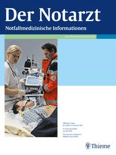
Notarzt
Connecting practitioners with pivotal findings in critical care.Notarzt is a well-regarded academic journal published by GEORG THIEME VERLAG KG, focusing on critical care, intensive care medicine, and emergency medicine. With an ISSN of 0177-2309 and an E-ISSN of 1438-8693, this German-based journal has been contributing to the medical field since its inception in 1985. Despite being categorized in the Q4 quartile for both Critical Care and Intensive Care Medicine and Emergency Medicine, Notarzt continues to provide a platform for innovative research, case studies, and developments that inform practitioners and researchers alike. With a publication history spanning significant years such as 1993 and 1999 to 2024, Notarzt is dedicated to improving outcomes in emergency and critical care settings through the dissemination of pivotal findings and comprehensive reviews. Although currently not an Open Access journal, it remains an essential resource for professionals striving to stay abreast of developments in their field.
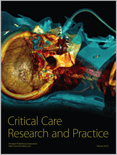
Critical Care Research and Practice
Advancing knowledge in critical care for a healthier tomorrow.Critical Care Research and Practice is a distinguished open-access journal published by HINDAWI LTD that has been at the forefront of disseminating vital research in the fields of critical care and intensive care medicine since its inception in 2010. With an impressive Q2 ranking in its category and positioned in the top 63rd percentile according to Scopus rankings, the journal serves as a critical platform for researchers, practitioners, and students aiming to advance their understanding and improve outcomes in intensive care settings. Based in Egypt, the journal's breadth encompasses diverse aspects of critical care, including innovations in treatment protocols, evidence-based practices, and the latest advancements in patient care strategies. Through its commitment to open access, Critical Care Research and Practice ensures that high-quality research is readily available to a global audience, fostering collaboration and knowledge sharing across the medical community.
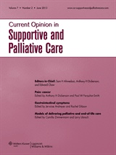
Current Opinion in Supportive and Palliative Care
Fostering insights for compassionate healthcare solutions.Current Opinion in Supportive and Palliative Care, an esteemed journal published by Lippincott Williams & Wilkins, provides a vital platform for the dissemination of contemporary research and expert perspectives in the fields of supportive and palliative care. As part of the medical community's growing focus on critical care and oncology, this journal has earned its place in the Q2 category across multiple rankings, reflecting its influence and significance in advancing knowledge and practices. With its ISSN 1751-4258 and E-ISSN 1751-4266, it covers literature from 2007 to 2024, making it a reliable resource for the latest developments. While it does not offer open access, the journal ensures careful curating of high-quality articles, fostering a deeper understanding of complex care needs. Researchers, clinicians, and students alike will benefit from the journal's insights, exploring innovative strategies and multidisciplinary approaches to improve patient outcomes in critical situations. The commitment to such a crucial area of healthcare underscores the importance of this publication in shaping future practices and policies.
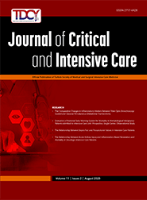
Journal of Critical & Intensive Care
Catalyzing progress in critical and intensive care practices.The Journal of Critical & Intensive Care, published by the esteemed Soc Turkish Intensivists - STI, serves as a vital platform for advancing knowledge and research in the evolving fields of critical care and intensive medicine. Since its inception in 2020, this journal has focused on disseminating high-quality research that addresses the complexities and challenges faced in the intensive care units, positioning itself as a critical resource for healthcare professionals, researchers, and students in Turkey and beyond. Although currently categorized in the Q4 quartile for Critical Care and Intensive Care Medicine, with a Scopus rank of 99 out of 110, the journal is rapidly gaining attention for its scholarly contributions. With an ongoing commitment to open access principles, it aims to enhance accessibility to groundbreaking studies and reviews, promoting collaborative progress in the critical care domain. The Journal of Critical & Intensive Care is not just a publication; it is a catalyst for innovation and knowledge-sharing critical to improving patient outcomes in intensive care settings.
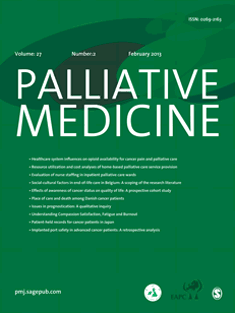
PALLIATIVE MEDICINE
Championing Comprehensive Care for Life-Limiting IllnessesPalliative Medicine is a premier journal dedicated to advancing the field of palliative care, published by SAGE Publications Ltd. Established in 1987 and continuing through 2024, this esteemed journal focuses on the integration of pain management and comprehensive care for patients with life-limiting illnesses. With its impressive impact factor and a prestigious Q1 ranking in both Anesthesiology and Pain Medicine, as well as in Medicine (miscellaneous), it stands as a critical resource for researchers, healthcare professionals, and students engaged in this vital area of medicine. The journal emphasizes original research, reviews, and clinical studies that contribute to the understanding and practice of palliative care, promoting improved quality of life and support for patients and their families. Although not open access, articles are accessible through institutional subscriptions, ensuring the dissemination of knowledge to a wide audience. Whether you are a seasoned researcher or an emerging professional in the field, Palliative Medicine remains an invaluable platform for scholarly exchange and innovation.

Acute and Critical Care
Exploring breakthroughs in acute medical situations.Acute and Critical Care is a leading open-access journal dedicated to the fields of critical care and intensive care medicine, published by the Korean Society of Critical Care Medicine. Since its inception in 2014, this journal has provided a platform for the dissemination of high-quality research, reviews, and innovative practices aimed at improving patient outcomes in acute medical situations. With an impressive Q2 ranking in both Critical Care and Intensive Care Medicine and in Critical Care Nursing for the year 2023, it is recognized as an influential source of knowledge among professionals in the field. The journal is indexed in Scopus, with notable rankings—7th out of 27 in Critical Care Nursing and 48th out of 110 in Critical Care and Intensive Care Medicine—highlighting its credibility and relevance. Situated in Seoul, South Korea, Acute and Critical Care aims to foster collaboration and engagement within the global community of researchers, presenting cutting-edge clinical applications and advancements in patient care.
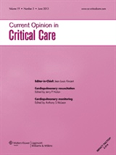
Current Opinion in Critical Care
Shaping the future of intensive care medicine.Current Opinion in Critical Care, published by Lippincott Williams & Wilkins, is a leading journal in the field of Critical Care and Intensive Care Medicine. With an ISSN of 1070-5295 and an E-ISSN of 1531-7072, this esteemed journal has been committed to disseminating high-quality and impactful research since its inception in 1996. The journal proudly ranks in the top quartile (Q1) of its category for 2023, affirming its position among the premier publications in critical care, with a Scopus ranking of #25 out of 110, placing it in the 77th percentile. Current Opinion in Critical Care offers essential insights, reviews, and discussions on the latest trends and best practices in the field, catering to the needs of researchers, clinicians, and students alike. Though it does not provide open access options, its contributions are pivotal in shaping patient care approaches and advancing clinical outcomes in critical care settings.
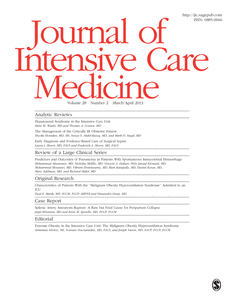
JOURNAL OF INTENSIVE CARE MEDICINE
Shaping the Future of Critical CareJOURNAL OF INTENSIVE CARE MEDICINE, published by SAGE PUBLICATIONS INC, is a leading peer-reviewed journal dedicated to advancing the field of critical care and intensive medicine. With an ISSN of 0885-0666 and an E-ISSN of 1525-1489, this esteemed journal showcases innovative research, clinical practices, and synthesis of knowledge that informs the complexities of patient care in intensive settings. Recognized for its exceptional impact, it holds a prestigious Q1 ranking in the Critical Care and Intensive Care Medicine category, landing in the upper 15% of its field according to Scopus rankings. Celebrating over three decades of publication since its inception in 1986, the journal serves both as a resource for seasoned professionals and a platform for emerging researchers eager to contribute to evidence-based practice. Although not open access, the journal ensures that critical insights and advancements are accessible to a broad audience, fostering a collaborative environment that is essential for the evolution of intensive care protocols and the enhancement of patient outcomes. With its commitment to excellence, the JOURNAL OF INTENSIVE CARE MEDICINE stands out as an invaluable resource that continues to shape the future of healthcare in critical domains.
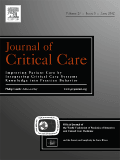
JOURNAL OF CRITICAL CARE
Leading the Charge in Critical Care InnovationJOURNAL OF CRITICAL CARE, published by W B SAUNDERS CO-ELSEVIER INC, is a prestigious peer-reviewed journal in the field of critical care and intensive care medicine. With an impressive Q1 classification in 2023, it stands as a leading publication among its peers, ranking #12 out of 110 in the Scopus database, which places it in the 89th percentile of critical care-related journals. Established in 1986 and with a converged timeline extending to 2025, the journal serves as a critical resource for international researchers, healthcare professionals, and students dedicated to advancing practices and understanding within the realm of critical care. Although it does not offer Open Access, the journal provides high-quality, rigorously reviewed articles that address contemporary issues, innovative techniques, and groundbreaking research in critical care medicine. By fostering scholarly dialogue and disseminating new knowledge, the JOURNAL OF CRITICAL CARE is pivotal in shaping the future of intensive patient care and enhancing health outcomes.

Annals of Intensive Care
Elevating patient outcomes in critical care medicine.Annals of Intensive Care is a premier, peer-reviewed journal dedicated to advancing the field of critical care and intensive care medicine. Published by Springer since 2011, this open-access journal is renowned for disseminating high-quality research and clinical studies that inform and influence practice in intensive care settings worldwide. With an impressive impact factor and a prestigious Q1 ranking in its category, it ranks #6 out of 110 in Critical Care and Intensive Care Medicine, placing it in the 95th percentile of its field according to Scopus. The journal aims to foster collaboration among researchers, clinicians, and policymakers by providing a platform for innovative research findings, case studies, and thought-provoking reviews. Addressed to an international audience committed to improving patient outcomes in critical care, Annals of Intensive Care plays a crucial role in shaping the future of intensive care medicine with its commitment to excellence in research and scholarship.